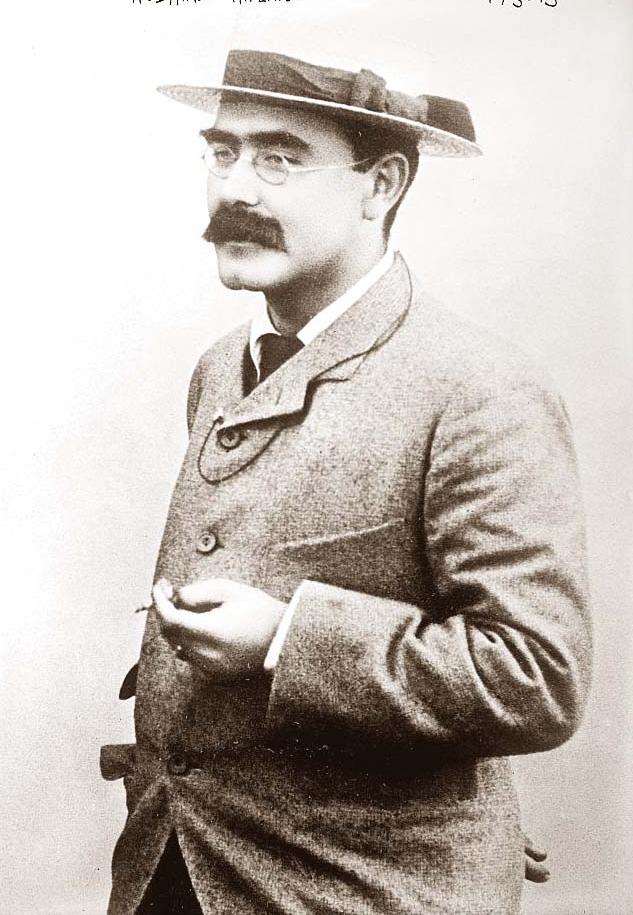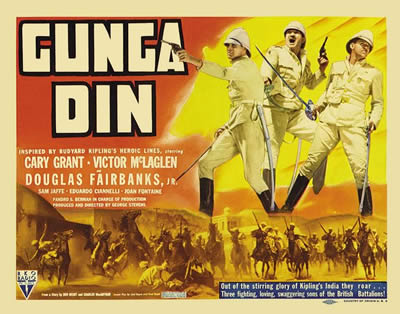Where’s Rudyard?
May 9th, 2011
I have been conducting an informal survey lately, to see how many of my acquaintance are familiar with the works of Rudyard Kipling, most particularly his “Stalky” stories. So far, the results have not been very encouraging for the Pukka Sahib. Most know who he was, but few have read any of his works — poetry or prose — and none have even heard of Stalky & Co.

So I have decided that the world is in great need of more Rudyard Kipling. If you’re young, or possess a fanciful bent, I recommend Kipling’s Just So Stories. If you haven’t much time to read these days, try grazing your way through the short stories in Plain Tales from the Hills. But for real, pure enjoyment, find a copy of Stalky & Co.
Of course, reading Kipling requires more than a little tolerance. One might characterize him as a misogynistic, xenophobic imperialist. I find his humor makes up for his politics, and his talent for storytelling takes care of the rest. After all, we are talking about the fin de siècle British army…I particularly appreciate my recent re-readings of Kipling since my foray into T.E. Lawrence (aka Lawrence of Arabia), who wrote in Seven Pillars of Wisdom, “Some of the speed and secrecy of our victory…might perhaps be ascribed to…the rare feature that from end to end of it there was nothing female in the Arab movement, but the camels.” Of course Kipling writes about India, not Arabia, but the attitudes are quite similar.

Even if you don’t heed my plea to find a copy of something by Kipling, you can at least read his most famous poem (immortalized in 1939 by a film starring Cary Grant, Douglas Fairbanks Jr., and Sam Jaffe in the title role):
GUNGA DIN
YOU may talk o’ gin an’ beer
When you’re quartered safe out ‘ere,
An’ you’re sent to penny-fights an’ Aldershot it;
But if it comes to slaughter
You will do your work on water,
An’ you’ll lick the bloomin’ boots of ‘im that’s got it.
Now in Injia’s sunny clime,
Where I used to spend my time
A-servin’ of ‘Er Majesty the Queen,
Of all them black-faced crew
The finest man I knew
Was our regimental bhisti, Gunga Din.It was “Din! Din! Din!
You limping lump o’ brick-dust, Gunga Din!
Hi! slippy hitherao!
Water, get it! Panee lao!
You squidgy-nosed old idol, Gunga Din!”The uniform ‘e wore
Was nothin’ much before,
An’ rather less than ‘arf o’ that be’ind,
For a twisty piece o’ rag
An’ a goatskin water-bag
Was all the field-equipment ‘e could find.
When the sweatin’ troop-train lay
In a sidin’ through the day,
Where the ‘eat would make your bloomin’ eyebrows crawl,
We shouted “Harry By!”
Till our throats were bricky-dry,
Then we wopped ‘im ’cause ‘e couldn’t serve us all.It was “Din! Din! Din!
You ‘eathen, where the mischief ‘ave you been?
You put some juldee in it,
Or I’ll marrow you this minute,
If you don’t fill up my helmet, Gunga Din!”‘E would dot an’ carry one
Till the longest day was done,
An’ ‘e didn’t seem to know the use o’ fear.
If we charged or broke or cut,
You could bet your bloomin’ nut,
‘E’d be waitin’ fifty paces right flank rear.
With ‘is mussick on ‘is back,
‘E would skip with our attack,
An’ watch us till the bugles made “Retire.”
An’ for all ‘is dirty ‘ide,
‘E was white, clear white, inside
When ‘e went to tend the wounded under fire!It was “Din! Din! Din!”
With the bullets kickin’ dust-spots on the green.
When the cartridges ran out,
You could ‘ear the front-files shout:
“Hi! ammunition-mules an’ Gunga Din!”I sha’n’t forgit the night
When I dropped be’ind the fight
With a bullet where my belt-plate should ‘a’ been.
I was chokin’ mad with thirst,
An’ the man that spied me first
Was our good old grinnin’, gruntin’ Gunga Din.‘E lifted up my ‘ead,
An’ ‘e plugged me where I bled,
An’ ‘e guv me ‘arf-a-pint o’ water—green;
It was crawlin’ an’ it stunk,
But of all the drinks I’ve drunk,
I’m gratefullest to one from Gunga Din.It was “Din! Din! Din!
‘Ere’s a beggar with a bullet through ‘is spleen;
‘E’s chawin’ up the ground an’ ‘e’s kickin’ all around:
For Gawd’s sake, git the water, Gunga Din!”‘E carried me away
To where a dooli lay,
An’ a bullet come an’ drilled the beggar clean.
‘E put me safe inside,
An’ just before ‘e died:
“I ‘ope you liked your drink,” sez Gunga Din.
So I’ll meet ‘im later on
In the place where ‘e is gone—
Where it’s always double drill and no canteen;
‘E’ll be squattin’ on the coals
Givin’ drink to pore damned souls,
An’ I’ll get a swig in Hell from Gunga Din!Din! Din! Din!
You Lazarushian-leather Gunga Din!
Tho’ I’ve belted you an’ flayed you,
By the livin’ Gawd that made you,
You’re a better man than I am, Gunga Din!— Rudyard Kipling
Last, but not least, my own best beloved just turned me on to this mind-blowing gem (please ignore the incongruous footage from Easy Rider):

IF…one of the greatest expressions of wakefulness and humanity ever written, even modest unto itself.
An’ Rudyard you can find ‘im in the rotted boards by ale beneath the smokey laugh o’ lads too soon dead, in brothels and keeps o’ the separation where the blood of ‘eros dried…where men tramp sawdust an’ horse flop in boots not never shined..Rudyard, you’ll find ‘im in the ‘earts o’ ‘onorable men, those broken things that fill wi’ aires just for the treason of things. An’ if you look ‘ard enough, you’ll see ‘im in the eyes of old men…who found the truth so late.
[…] spoken out before this in favor of Rudyard Kipling; one of late-19th century Britain’s literary giants who has, […]